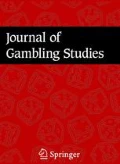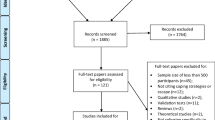Abstract
Despite the negative consequences associated with gambling, few problem gamblers seek professional help. This study aimed to examine awareness of professional sources of help and help-seeking behaviour amongst regular and problem gamblers. Australian gamblers (N = 730) were recruited from the general population, multicultural gambling venues, and gambling helplines and treatment services. Surveys measured awareness of professional help services, help-seeking behaviour and motivators and barriers to seeking help. Gamblers demonstrated low awareness of professional help services. Problem gamblers born in Australia or who were divorced were more likely to seek help. Problem gamblers who were reluctant to seek help due to a desire solve the problem on their own and feeling ashamed for themselves or their family pride were more likely to have overcome these barriers to seek help. However, significant barriers related to denial of problem severity and concerns about the ability to access low cost services that cater for multicultural populations predicted a lower likelihood of having sought help. Public education should aim to de-mystify the treatment process and educate gamblers about symptoms of problem gambling to reduce shame, stigma, and denial and encourage help-seeking. Ongoing education and promotion of help services is required to increase awareness of the resources available, including targeted promotions to increase awareness of relevant services among specific populations.
Similar content being viewed by others
References
Abbott, M. W. (2001). Problem and non-problem gambling in New Zealand: A report on phase two of the 1999 national prevalence survey. Wellington: Department of Internal Affairs.
Blaszczynski, A., Huynh, S., Dumlao, V. J., & Farrell, E. (1998). Problem gambling within a Chinese speaking community. Journal of Gambling Studies, 14, 359–380.
Carlbring, P., & Smit, F. (2008). Randomized trial of internet-delivered self-help with telephone support for pathological gamblers. Journal of Consulting and Clinical Psychology, 76, 1090–1094.
Clarke, D., Abbott, M., Tse, S., Townsend, S., Kingi, P., & Manaia, W. (2006). Gender, age, ethnic and occupational associations with pathological gambling in a New Zealand urban sample. New Zealand Journal of Psychology, 35, 84–91.
Davidson, T., & Rodgers, B. (2010). 2009 Survey of the nature and extent of gambling, and problem gambling, in the Australian Capital Territory. Canberra: Australian National University.
Derevensky, J., & Gupta, R. (2004). Gambling problems in youth: Theoretical and applied perspectives. New York: Kluwer Academic/Plenum Publishers.
Dhillon, J., Horch, J. D., & Hodgins, D. C. (2011). Cultural influences on stigmatization of problem gambling: East Asian and Caucasian Canadians. Journal of Gambling Studies, 27, 633–647.
Evans, L., & Delfabbro, P. (2005). Motivators for change and barriers to help-seeking in Australian problem gamblers. Journal of Gambling Studies, 21, 133–155.
Ferris, J., & Wynne, H. (2001). The Canadian problem gambling index: Final report. Ottawa: Canadian Centre on Substance Abuse.
Fong, D., Fong, H. N., & Li, S. Z. (2011). The social cost of gambling in Macao: Before and after the liberalisation of the gaming industry. International Gambling Studies, 11, 43–56.
Gainsbury, S., & Blaszczynski, A. (2011a). A systematic review of Internet-based therapy for the treatment of addictions. Clinical Psychology Review, 31, 490–498.
Gainsbury, S., & Blaszczynski, A. (2011b). Online self-guided interventions for the treatment of problem gambling. International Gambling Studies, 11, 289–308.
Gooding, P., & Tarrier, N. (2009). A systematic review and meta-analysis of cognitive-behavioural interventions to reduce problem gambling: Hedging our bets? Behaviour Research and Therapy, 47, 592–607.
Hardoon, K., Derevensky, J., & Gupta, R. (2003). Empirical vs. perceived measures of gambling severity: Why adolescents don’t present themselves for treatment. Addictive Behaviors, 28, 933–946.
Hodgins, D. C., Currie, S. R., Currie, G., & Flick, G. H. (2009). Randomized trial of brief motivational treatments for pathological gamblers: More is not necessarily better. Journal of Consulting and Clinical Psychology, 77, 950–960.
Hodgins, D., & el-Guebaly, N. (2000). Natural and treatment-assisted recovery from gambling problems: A comparison of resolved and active gamblers. Addiction, 95, 777–789.
Hodgins, D. C., Makarchuk, K., el-Guebaly, N., & Peden, N. (2002). Why problem gamblers quit gambling: A comparison of methods and samples. Addiction, Research & Theory., 10, 203–218.
Hodgins, D. C., Stea, J. N., & Grant, J. E. (2011). Gambling disorders. The Lancet, 378, 1874–1884.
Holtgraves, T. (2009). Evaluating the problem gambling severity index. Journal of Gambling Studies, 25, 105–120.
Ledgerwood, D. M., Arfken, C. L., Wiedemann, B. S., Bates, K. E., Holmes, D., & Jones, L. (2013). Who goes to treatment? Predictors of treatment initiation among gambling help-line callers. The American Journal on Addictions, 22, 33–38.
Loo, J. M. Y., Raylu, N., & Oei, T. P. S. (2008). Gambling among the Chinese: A comprehensive review. Clinical Psychology Review, 28(7), 1152–1166.
Marotta, J. J. (2000). Recovery from gambling problems with and without treatment. Paper presented at the 11th International Conference on Gambling and Risk Taking, Las Vegas, NV.
McMillen, J., Marshall, D., Murphy, L., Lorenzen, S., & Waugh, B. (2004). Help seeking by problem gamblers, friends and families: A focus on gender and cultural groups. Canberra: Centre for Gambling Research, Regnet, Australian National University.
McMillen, J., & Wenzel, M. (2006). Measuring problem gambling: Assessment of three prevalence screens. International Gambling Studies, 6, 147–174.
Ministry of Community Development, Youth and Sports. (2008). Report of survey of participation in gambling activities among Singapore residents. Singapore: Ministry of Community Development, Youth and Sports.
Mojtabai, R., Olfson, M., & Mechanic, D. (2002). Perceived need and help-seeking in adults with mood, anxiety, or substance use disorders. Archives of General Psychiatry, 59(1), 77–84.
Monaghan, S., & Wood, R. T. A. (2010). Internet-based interventions for youth dealing with gambling problems. International Journal of Adolescent Health and Medicine, 22(1), 113–128.
Orford, J., Wardle, H., Griffiths, M., Sproston, K., & Erens, B. (2010). PGSI and DSM-IV in the 2007 British Gambling Prevalence Survey: Reliability, item response, factor structure and inter-scale agreement. International Gambling Studies, 10, 31–44.
Pallesen, S., Mitsem, M., Kvale, G., Johnsen, B. H., & Molde, H. (2005). Outcome of psychological treatments of pathological gambling: A review and meta- analysis. Addiction, 100, 1412–1422.
Petry, N. M., Weinstock, J., Ledgerwood, D., & Morasco, B. (2008). A randomized trial of brief interventions for problem and pathological gamblers. Journal of Consulting and Clinical Psychology, 76, 318–328.
Productivity Commission. (2010). Gambling, Report no. 50, Canberra.
Pulford, J., Bellringer, M., Abbott, M., Clarke, D., Hodgins, D., & Williams, J. (2009). Reasons for seeking help for a gambling problem: The experiences of gamblers who have sought specialist assistance and the perceptions of those who have not. Journal of Gambling Studies, 25, 19–32.
Raylu, N., & Oei, T. P. (2004). Role of culture in gambling and problem gambling. Clinical Psychology Review, 23(8), 1087–1114.
Raylu, N., Oei, T. P. S., & Loo, J. (2008). The current status and future direction of self-help treatments for problem gamblers. Clinical Psychology Review, 28(8), 1372–1385.
Scull, S., & Woolcock, G. (2005). Problem gambling in non-English speaking background communities in Queensland, Australia: A qualitative exploration. International Gambling Studies, 5, 29–44.
Stevens, M., Golbebiowska, K., & Morrison, P. (2010). Correlates of reported gambling problems in the CALD population of Australia. Melbourne: Office of Gaming & Racing, Department of Justice.
Suurvali, H., Cordingley, J., Hodgins, D. C., & Cunningham, J. (2009). Barriers to seeking help for gambling problems: A review of the empirical literature. Journal of Gambling Studies, 25, 407–424.
Suurvali, H., Hodgins, D., Toneatto, T., & Cunningham, J. (2008). Treatment seeking among Ontario problem gamblers: Results of a population survey. Psychiatric Services, 59, 1343–1346.
Suurvali, H., Hodgins, D., Toneatto, T., & Cunningham, J. (2012). Motivators for seeking gambling-related treatment among Ontario problem gamblers. Journal of Gambling Studies, 28, 273–296.
Tavares, H., Martins, S. S., Zilberman, M. L., & el-Guebaly, N. (2002). Gamblers seeking treatment: Why haven’t they come earlier? Addictive Disorders & Their Treatment, 1, 65–69.
Toneatto, T., & Ladoceur, R. (2003). Treatment of pathological gambling: A critical review of the literature. Psychology of Addictive Behaviors, 17, 284–292.
Wardle, H., Moody, A., Spence, S., Orford, J., Volberg, R., Jotangia, D., et al. (2011). British gambling prevalence survey 2010. London: National Centre for Social Research.
Welte, J. W., Barnes, G. M., Tidwell, M.-C. O., & Hoffman, J. H. (2008). The prevalence of problem gambling among U.S. adolescents and young adults: Results from a national survey. Journal of Gambling Studies, 24, 119–133.
Wooksoo, K. (2012). Acculturation and gambling in Asian Americans: When culture meets availability. International Gambling Studies, 12, 69–88.
Acknowledgments
The authors would like to express their thanks and acknowledge the support of Gambling Research Australia, who provided funding for the research described in this manuscript.
Author information
Authors and Affiliations
Corresponding author
Rights and permissions
About this article
Cite this article
Gainsbury, S., Hing, N. & Suhonen, N. Professional Help-Seeking for Gambling Problems: Awareness, Barriers and Motivators for Treatment. J Gambl Stud 30, 503–519 (2014). https://doi.org/10.1007/s10899-013-9373-x
Published:
Issue Date:
DOI: https://doi.org/10.1007/s10899-013-9373-x




